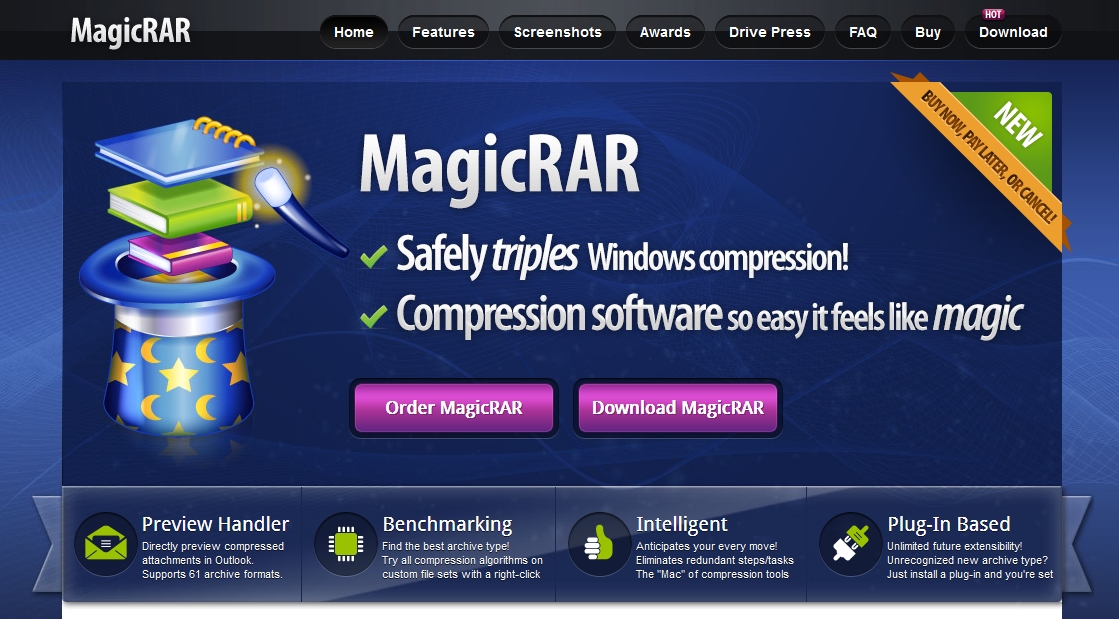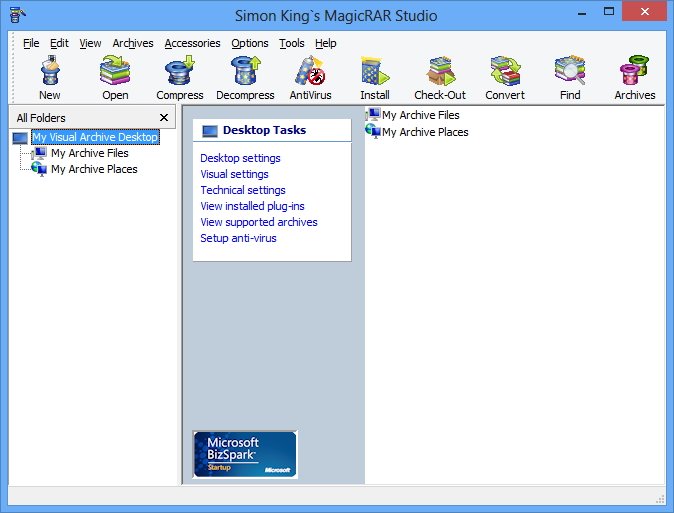Compression Performance: 7-Zip, MagicRAR, WinRAR, WinZip
We're taking a look at the the features, performance, and compression rates of four file archiving and compression tools: the free and open source 7-Zip, the heavyweight WinRAR, the old-school WinZip, and the lesser-known MagicRAR.
MagicRAR 8.0
Why you can trust Tom's Hardware
Next to 7-Zip, WinRAR, and WinZip, MagicRAR is a little more obscure. Not only is it the least-known compression utility in our round-up, but it’s also the only one that doesn’t have its own compression format, or make use of more than one processor core (Update: MagicRAR's author let us know that the software's 7z format is able to utilize two cores for compression jobs. Our tests were limited to the ZIP format, though switching to 7z wouldn't have made much difference, given the threading optimizations of 7-Zip). A single installer package contains both the 32- and 64-bit versions of the software. MagicRAR costs $25 from the company’s online store.
Since MagicRAR lacks its own compression format, this app doesn’t give preferential treatment to any one format, but rather leaves this choice completely up to the user. There are many formats to choose from and, because MagicRAR supports practically all of the popular compression formats via plug-ins, it’s easy to add support for new compression formats at any time. MagicRAR self-confidently markets itself as the tool to use if you need to use all compression formats. Due to the large number of included plug-ins, it was able to handle every format that we threw at it during our benchmarks.
As far as Windows Explorer integration, MagicRAR offers the context menu command “Find Smallest Archive”, which recommends the best format for the selected files and/or folders. This makes the decision of which compression format to use quite easy. The software also offers recursive decompression, which means that it can extract archives that are spread throughout multiple subfolders. MagicRAR comes with its own file manager and integrates with Microsoft Outlook.
The last way that MagicRAR stands out from the competition is, unfortunately, something that’ll give enthusiasts second thoughts. According to its developer, this application is supposed to yield especially good performance on SSDs. However, our benchmarks don’t bear this out. In fact, we found the opposite to be true. No other tool takes as long to compress files on SSDs, with only ZIP performance rating as acceptable.
Get Tom's Hardware's best news and in-depth reviews, straight to your inbox.
-
mayankleoboy1 1. There is no difference between LZMA and LZM2 . Both are the same algorithm. The only difference is LZMA is limited to 2 threads. LZMA2 is much more threaded, but uses double the amount of RAM.Reply
2. PPMd is strictly for compressing text. It compresses text better than any other algo. But it is limited to 1 core only.
3. WinRar 4.2 is much better threaded than previous versions.
4.7z threading depends a lot on the type of file compressed. On large files, it can use 100% of any number of cores. For many small files, it generally uses only 1 complete core. -
mayankleoboy1 7ZIP is even more impressive when you consider that the LZMA format was designed by one single person. And then the program 7ZIP was also coded by that single person only.Reply
Maybe contribute a few dollars to Igor Pavlov , the creator of 7Zip ? -
s3anister This is an interesting article, I was rather surprised by the overall poor performance of WinRAR in every aspect when compared to 7zip.Reply -
ojas Hey i had written this in the Haswell preview, but i think Chris missed it, so i'm repeating it here, since it is related.Reply
Could we have an AES-256 encryption comparison between CPUs and/or archive managers?
Like without encryption vs with encryption, encryption with and without OpenCL, etc. -
abbadon_34 Nothing new here, 7zip > WinRar > WinZip for quite some time. Why the inclusion of MagicRAR is a mystery, maybe a paid (failed) review? I'd be interested in an examine of the Parity/Recovery option of WinRAR and others. While still far behind PAR2 (or even the shady ICE Ecc), it is an important feature in Archiving that deserves more attention.Reply -
PreferLinux mayankleoboy11. There is no difference between LZMA and LZM2 . Both are the same algorithm. The only difference is LZMA is limited to 2 threads. LZMA2 is much more threaded, but uses double the amount of RAM.Reply
2. PPMd is strictly for compressing text. It compresses text better than any other algo. But it is limited to 1 core only.
3. WinRar 4.2 is much better threaded than previous versions.
4.7z threading depends a lot on the type of file compressed. On large files, it can use 100% of any number of cores. For many small files, it generally uses only 1 complete core.4. You mean the 7Z format rather than 7-Zip.
I've seen 7-Zip, using the Zip format, hitting 100% CPU usage when archiving around 1500 – 2000 files, the vast majority of which (like >75%, if not >90%) were tiny, about half under 100 B and the other half between 1 kB and 4 kB. But with the same set of files I did a quick test, and using LZMA2 to 7z it was using 1 and a bit cores (going by my total CPU usage).

